
PoetryMagazine.com
Since 1996
March 2015 EXEMPLARS
Poetry Reviews
By Grace Cavalieri
WINTER’S HARVEST: 18 Books
Lines Of Defense by
Stephen Dunn.
New Paperback Edition. W.W. Norton & Co. 95pages
When this book was in hardback I read it with affection, and, now, another
chance, because, let’s be honest, timing is everything in what we read; even the
good ones sit on the shelf waiting. Every poem here shocked my senses awake
again as Dunn enters his fictional countries, and our emotional frontiers—the
most dangerous places of all. As with
the stock market, high levels of risk are associated with high potential
returns—meddling not with structure and
form—he’s got that like silk—but with ideas and philosophical content. Dunn’s
poems are
Poems are complex self-portraits and this chronicling presents a whole spiritual
body of a man.

This is the last stanza from BEFORE WE
LEAVE:
…….
Happiness is another journey,
almost over before it starts,
guaranteed to disappoint.
if you come for it, say so,
you’ll get your money back.
I hope you all realize that anytime
is a fine time to laugh Fake it,
however, and false laughter
will accompany you like a cowbell
for the rest of your days.
You’ll forever lack the seriousness
of a clown. At some point
the rocks will be jagged,
the precipice sheer. That won’t be
the abyss you’ll see, looking down.
The abyss, you’ll discover
(if you’ve made it this far),
is usually nearer than that—
at the bottom of something
you’ve yet to resolve,
or posing as your confidante.
Follow me. Don’t follow me. I will
say such things, and mean both.
_______________
Practicing the Truth
by Ellery
Akers. Autumn House Press. 82 pages.
It’s is one of life’s pleasures to enter into “the seeing” of a poet I didn’t
know before, Ellery Akers is a keen observer of her characters; and also about
who she is in relation to her poems.
She consoles as she explores experiences from her life that in lesser hands
would be anecdotal autobiography; but here each poem becomes a problem solved by
a poet who is a humanist. Poets share dreams and non-fiction narratives. But
how this is done negotiates the value
of the poem. Akers is forceful with language and brings a flexibility of motion
to her line. Each word becomes an element of validity so that we are seared by
truth. How to say the scene—whether brutal or yearning—without
challenging its enchantment— this is what makes extreme writing. We hope all
poets share honestly what they think and Akers makes compelling poems by
unfolding, line by line, a secret knowledge. She finds a tipping point in each
stanza which becomes emotionally acute; then she holds that line with authority.
The result is clarity of purpose, a promise met. We feel someone’s in charge,
and Akers makes every poem a shared interest with the reader. Poets don’t have
to talk louder to make their point. All they have to do, page after page, is be
reliable and circle thoughts wider and wider until we’re pulled in. I can’t say
strongly enough how story becomes an art form in this book. Ellery Akers has the
golden gift, with good profit to literature.

First and last stanzas of a two-page poem:
My Mother
Sunbathing
She got up around noon,
hung over, bruised where my father hit her,
tore off the black satin Sleepwell mask she slept in,
had her maid
hold back the curtain,
ate her one egg, one slice of toast, and got dressed:
a bikini. She lay on the lounger, oiled, eyes closed,
fished around the patio for her tumbler,
found it, stirred the ice with her finger,
then lifted it, eyes still shut, to her mouth.
I remember the knobs of corns on her toes, her high, pale
arches,
and how, from time to time, she’d flop her wrist into the
bushes
and absentmindedly pat the roses beside her,
and though I knocked out the Japanese beetles
that rolled in the petals and chewed their way through,
I doubt if she ever noticed.
……..
Drunk, in the dark, in the cool, her skin radiating heat
and gleaming with oil, she looked alien to the room,
and even to the earth, as if she wanted to go back to the
hot core
of the star,
which would deliver her.
________________
Castrata
by Laura Orem.
Finishing Line Books. 19 pages
The author begins by explaining her title, “The castrates were male singers who
were surgically emasculated before puberty to maintain purity of their voices.”
This was 18th, early 19th centuries. In this interior
design
5.
I write this down, then
throw it all away:
_____________________
The
Little Edge
by Fred
Moten. Wesleyan Press. 75 pages.
Wesleyan is always cutting edge, and it spares no expense for the best of
everything: poet, paper, design. I love the way this book is constructed with so
much space on the page, the way Beckett used light as a character. The poems are
explained as “shaped prose, “rhythmic blocks.” They read like jazz
sounds, using the edges of the note,
and so we have the book’s title. The lines are long—some too long to quote— but
they show the poem as a vehicle driven via a unique desire—like the long sound
of a horn—then the interruption.
Moten IS perspective. He comes at
language like an architect building time and space and utterance—creating access
his own way, completely aware that the exterior of each poem is its entrance.
I’m always interested in how broken phraseology can create unity. But I swear it
does, by the capability of the poet—otherwise we’d have a rubble of words. Moten
makes a scene, with the kind of heart a musician has, opening the heart in
public, seeing what falls out.

AKOMFRAHGMENT
The praline of amusement and
my
clinometric pearl can’t call it,
curve unnumbered. you can’t
ride that long, you can’t turn
that far, that cold coming and
going in and out of snow. the
speed of our washing is blinding
and our devotion is laughing
without a name or song. This is
our music, we’re many hymns
in
love with one another
warring out of circle almost,
almost frozen, color become
shape, you put your coat on me.
---------------
The 8th
House
by
There are characters here: Mary, Abraham, Jesus, sex, pigs, stew, stars, Angels,
pain, jelly and veal. The eternal and the pigsty get equal attention—bearing
witness—bearing witness to heritage—trimming the tree of life, just to knock it
down in the next stanza—then beautify it in the trash. This is a WAAY different
voice.

You’d better get your motorcycle on for this reading. This is NEW. And she’s off
and running.
…..
You can render pork, have pork, have a pork, pork a pork, pork a man
or
a pork, both having porks, observe porks, cook pork, sear pork,
eat pork, cut pork, analyze pork…
….
mary was organic and pure. She wore jeans in the summer. She believed
in
love and gave birth to a void…
…
There was fire in my loins and all the world
was wrapped in glistening fat.
All I wanted, I still want…
I
still want to be filled with the richest light.
___
Sand
Opera
by Philip
Metres. Alice James Books. 112
pages.
From the book’s notes: “Sand
Opera emerges from the dizzying position of being named but unheard as an
Arab American, and out of the parallel sense of seeing Arabs named and silenced
since 9/11.” Section One is
titled
Abu ghraib Arias. The
first poem The Blues of Lane Cotter
has lines blacked out as in censorship. This happens throughout the book, in
various poems, for a stunning dramatic effect. In Section two, there’s a floor
plan of an interrogation room that could chill the bone. (Black site, exhibit
Q.) And then, Section four, along with poems. is a detailed plan of a cell –Cell
6— accompanied by a poem, ”Black Site (Exhibit l,) I cannot replicate the
pointillistic display of words (forgive me Peter Metres,)
No matter how changed you think you
are, you’ll be more so after reading this book.
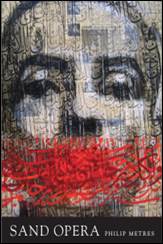
From “A Narrative of the Renditions of
Mohamad Faraq Ahmad Bashmilah”
In the wake of. I don’t even
speak the language. In
glances and glares.
My son, you are an Arab, be proud of it,
my Dad would say. I awaken. I
avoid pulling up beside
flagged trucks. Of ire I sing,
mirror. Who turns to see
me, the invisible now visible.
Who lives in a want ad for
a criminal act.
Fits the ethnicity, if you know what I
mean,
my colleague said. Myself as numb
stranger. My son,
you are an Arab, be proud of it. I
count turned heads, raised
eyebrows as the faculty meeting,
when two Muslims
are introduced as visiting
professors in physics. What
does it matter where numbers come
from? B’s father
is still missing. Whose face,
he’d joke, he never knew,
seeing it was always behind a
home movie camera. My
son, I caught myself saying to no one
who exists, I am air.
_____________
The Altar
of Innocence
by Ann
Bracken. New Academia/Scarith
press. 77 pages.
How does a little girl become woman, then artist, then educator and poet?
The beginning was a trouble zone with a gifted mother subdued by
depression, where the power of communication never visited home. Where do things
go when they’re lost? They’re carried to womanhood into an ill-shaped marriage,
one not fit for an artist who, this time, will not be hijacked into silence. The
poems are a reflection on what it takes to become whole; and, how western
medicine doesn’t help for all its strategic and tactical solutions. Instead,
poet Bracken reinvents herself into her own voice, her own way, onto her own
canvas.
The emotion is in the taut line. The lesson is invaluable. This is a book for
this time in history where women are moved from what is possible to what is
manifest. The book is a pushback to
authoritarianism and, from the shards–how to rise to our spiritual best.
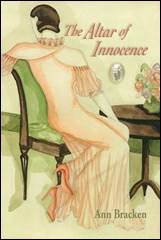
THE PORTAL
Sometimes Revelation comes in a whisper
as
tender as your first seduction.
This time, you see the thunderstorm lurking beyond his smile,
translate the promises into threats, sense an opening.
You slip into a portal that opens behind him and
claim your new life.
The cover image is from a watercolor fashion design, ”Sheer Elegance” by
Bracken’s Mother, Dorothy Wetzler, 1935, whom the book memorializes.
_______
Wild
Domestic
by Natania
Rosenfeld. The Sheep Meadow Press. 62 pages.
Here the poet deals with all creatures, wild and domestic, fish, fowl, human
kinds. There are wonderful poems of history. Here are portions of
All She Remembered,
in the voice of Bertha Rosenfeld,
1904-1991: “…
The first night on
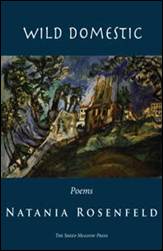
And of her own world, the author begins the poem, “Autobiography,”
A child, I entered
German
churches, pitied the gaunt man
hanging from open hands
like my father’s. I drew
his picture, brought it to him
at
morning.
They told me our God
had no face.
I
must learn
and immerse myself
to
be a Jew.
_____________
Shub’s
Cooking
by Shelby
Stephenson. Red Dashboard. 164 pages.
New North Carolina Poet Laureate
Stephenson is the voice of the
PECAN CAKE
I
can hear clearly outlining three birds – large –
Maybe red-tailed hawks, certainly not eagles
Over Paul’s Hill –
It’s famous for sparrows and sassafras trees.
A
squirrel’s at the little red schoolhouse feeder.
A
rat snake’s waiting for the martins to hatch.
The buzzard eyes the rabbit on the slope.
Down the hill at Rehobeth Church a picnic—
table’s heavy –
Stew beef, steaks, chicken, barbeque
And one of those big-old-out-of-this-world
Pecan cakes:
…….
Ah Wind:
Uncollected Poems
by Carolyn
Stoloff. MadHat Press. 109 Pages.
Stoloff is well known in American letters and over the years loses none of her
tenacity—the pretty workings of a seasoned mind. Her places are of this earth:
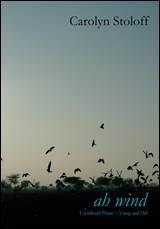 NOTHING
SHORT OF A MIRACLE
NOTHING
SHORT OF A MIRACLE
there is a lonely bell
a
map without ports
a
white bedroom with no dimension
oh
the distance …
then the horizon’s belt
sky meets sea
in
silk harbors, in the lungs,
in
petals sadly curled
in
love’s raft – a wafer
dissolving on night’s tongue.
-----
The Last
Two Seconds
by Mary Jo
Bang. Graywolf Press. 75 pages.
I’m still thinking of Bang’s previous book, translation of Dante’s
Inferno, with Heaven and Hell and Stephen Colbert all clearing our fugue
state.
The Last Two Seconds
is Bang’s authentic voice with its joy
of living—sentenced to death—but emerging with vindication. Some of her poems
seem uncertain about herself in the world; yet, her dignity and imagination
shine out as if they are dreams we’re waking from feeling much happier. After
the book closes, we say,
“Yes, there is more to life. What is more?
This is
the more.”
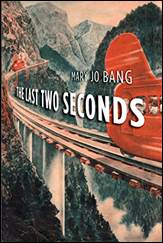
READING CONRAD’S
HEART OF DARKNESS
1.
Think of yourself as a character. It’s hot today,
in
the house it’s cooler. Cool air rises off the floor and meets
the heat that inches in through the window.
Listen to the cicadas, the monkeys.
Whatever evaporates. The boat is dragged forward
along a matched track—to what is that attached?
Today, we will read a book and play in the right chamber.
……
_________________
The Grief Muscles
by Brandon
Courtney. The Sheep Meadow Press. 112 pages.
What poets do we remember from World War I and World War II? Tragedy is never
finished providing lyrics for poetry and I honestly think Courtney will be among
those remembered for our recent conflicts. He
writes, “…howitzer/ shells. 200 miles
from
Can wood be turned to gold? Can war be stomached any better when staged,
emotionally, through poems? Whatever the answer, Courtney calls it out with
skill, tricking the brain into thinking we can bear it. And the beauty he makes,
in the end, is true.
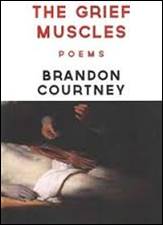
POST-TRAUMATIC STRESS DISORDER
In
a country you’ll never see,
an
IED tears apart a man.
He
tries again and again
to
stand on legs no longer
there, the lesser knots
of
his knees finally untied.
In
cities built on sand,
the scar carries the wound
into the future; the bandages
won’t stop unraveling.
Sometimes, blood, like breast
milk, leaves the body
through the smallest of holes.
No, there is nothing
miraculous about the body—
it
ends. I’ve stood this close
to
violence; I’ll never be the same.
-------------------------
Swimming
in the Rain: New and Selected Poems,
1980-2015.
by Chana Bloch. Autumn
House Press. 211 pages
“The adult heart is the size of a fist”
says Bloch—and her New & Selected poems explore its aspects. She’s the empress
of relationships—the lover,
husband, father,
“What’s between us/ seems flexible
as the webbing/ between forefinger and thumb…”
In another, she waits to hear about the size of a tumor in the poem
“Inside Out.” We wait as well. Bloch
is essential reading for anyone who has ever loved anyone and that makes a wide
audience for her. In High Wind,
Block says
“…There is still time to say what the two
of us/ never dared—//Let it bring the house down.”
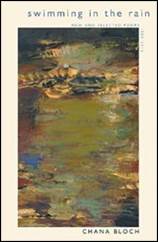
SOMETIMES I WANT TO SINK INTO YOUR BODY (from the book
Blood Honey 2006.)
Sometimes I want to sink into your body
with the fever that spikes inside me
to
be a woman
who can open a man.
Why must I be only softness and haunches,
a
satin cul-de-sac?
You ought to know what sharpens me
like a barbed arrow.
Do
you think we’re so different?
How you tease me, twiddle me,
hustle me along,
just when I’d like to splay you
tooth and nail.
------------
Sugar
Let’s give Ochester the Mark Twain Award for his poem
“at a country diner”
or “an evening with Gerald
Stern.” He ends a poem titled “early
morning, writer’s conference” with
“…Right
now all I want is a little more coffee,/a little more silence, a few pages/ of
scrap paper and a pen that works,/ a couple more poems to read as/ a momentary
respite from endless chat/ about all this excellence, excellence, excellence.”
This whole book is just what we need
with its three kinds of cheese in
diamond sutra
The reader says
“this is my last poem
but”—smiling—“it’s
twenty minutes long”
then reads an
epigraph from the Diamond Sutra
saying life’s one
long series of illusions—
which like his
poem,
is boring too
_______________
From The
Poems from eleven books are in this Pulitzer Prize winner’s new volume; and so
posterity is right now. I’ve been
reading Jorie Graham since she began and I don’t look for “story” but I just let
the energy move through me jolting the chair. Language is the only way she can
express her multiple ideas and urges. And so we let that happen and we
understand her through our bodies. She’s a major voice and a welcome one in a
country where we value our differences more than any other country—especially in
poetry. Overall, she improves the situation in literature, and life, just for
her originality and— like a hero— she doesn’t look back over her shoulder for
what should have been said another way. I’d say she’s instrumental in hydrating
language so that it won’t wilt away. I’ll always wonder how she’d judge her own
work because it seems to be only discussed at extreme sides of the spectrum of
love/dismissal by critics.
Many readers get her messages although many others do not, but
this book is for
the audience who wants new ways to go. Her premise is reason—her method
is compression—
not persuasion via letters or portraits or possessions like other poets. Her
presence comes up more in a situation or a habitat, as apparatus for emotion.
What happens in daily life doesn’t always matter to Graham— she’ll just
relate something to something else. That’s perspective—temporal, spatial,
although she’ll not always place it in real time. Forget metaphor, instead she
spiral movements, pacing equivalences. Some say it directly, not Jorie Graham
who confronts with neurons that I fear we don’t all have.
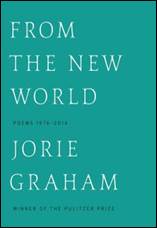
What’s the risk? Resolution? She’s got that—Unity? Sometimes. Completion? Well,
reconciliation, for sure. Listen, in her poems we may never hear the dialogue on
the bus or the primary colors of the ghetto, but these new poems of hers—well,
they vanish, then they open the door to the terrace where others merely describe
the trees. To believe in something enough to “express the inexpressible”—as we
say— to take the blind down the road not seen,
well I love it. I wish she’d tell us something we don’t know, though—how her
poetry would feel to her if it were written by somebody else.
I mostly favor the poems Graham writes about her own vulnerabilities, This new
poem is about a surgical procedure. Here’s the last stanza of the poem
Prying. If readers say they don’t
understand it, they’re probably reading too fast.
……..
me hoping to do nothing wrong, then hoping for a bargain,
asking how long before one would be able to live again
as if—
and those other turns in the brine—the
yet—if
not,
if now, and
now, when now—turn towards me now a bit you say to them and then
let’s turn the torso this way please, recheck marked spot.
Can see the guide wiresbut can no longer feel them.
Then the thing on the other side, the person who will open
up my hand and say
it’s over now can you hear me here is some water.
And in my living room cut flowers still in their paper
stapled up. Undelivered.
And you get a little extra life to live now—here—can you
still live it.
_________________________
Best
Chapbooks
Mother, Loose
by Brandel
Sometimes nursery rhymes, sometimes fairy tales, much humor and France de Bravo
makes poetry reflexive to all this. She comes at her primary sources with new
imagination dying to get out. Her three poems
“In The Arms of Morpheus”
describe a strange decline we’re not sure is autobiographical or
mystical or both—always dynamic. This is a delightful funny, sad book making us
believe that the power of the image is the most important issue of the day.

JACK SPRAT
He
looked like six o’clock
and she the face.
Together they were bacon
—sinew and glisten—
And called a platter home.
She licked the welcome mat.
He
licked the light switches.
She licked his arm chair.
He
licked her vanity.
One day, in the pantry,
their tongues met
and they knew salty-sweet,
felt time running in place.
Afterwards, Jack lit a cigarette.
-----------
Add To
Cart
by Michael
Spielberg. The Ludo Press. 40 pages.
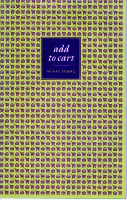
A
…
…reflecting off
that silvered dish
to you wherever you
might be
all the words I
never spoke out loud.
Look, at just the
right moment,
and you’ll receive
them
without
interference.
Adjust the tuning.
Guarantee me a good
reception.
______
Wildcat
Creek
by Worth
Bateman. Seasonings Press. 22 pages.
A no-nonsense set of poems clearly a part of the poet’s fiber—no artificial
flavorings. From “Moving Hydrangeas”
So
now it’s time to put the tools away;
this season’s almost over
and we’ve prepared as best we can for the next;
the firewood stacked along the porch is ready
and soon the Lenten roses will be blooming in the snow.
_______